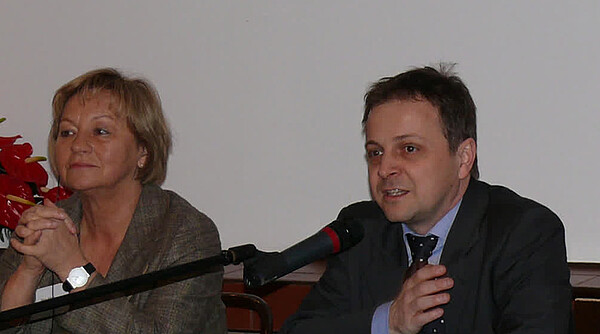IB Polska has now been in existence for two decades - you have been there from the very beginning. Tell us something about the background and the beginnings of the foundation.
Everything actually goes back to 1989. The political turnaround changed the previous supposed certainties, the way we had looked at our neighboring countries until then, simply everything. Suddenly we had new neighbors - but we knew little about Poland, about its culture, about the suffering of its people during the Second World War. The IB with its institutions near the border - such as Frankfurt/Oder - was immediately very interested in facilitating encounters between Poles and Germans.
Before the IB Polska was actually founded, a lot had to happen politically. What paved the way for good relations between Poland and Germany?
On June 17, 1991, Poland and Germany signed the "Treaty on Good Neighborliness and Friendly Cooperation". The German-Polish Youth Office (DPJW), based in Warsaw and Potsdam, was also founded in this context. I myself was appointed to the Board of Trustees of the DPJW in 2000, of which Richard Schottdorf, Managing Director of the IB International Department, is now also a member. Since the early nineties, the IB has had a lively cooperation with the Polish OHP, an organization that deals with vocational training in Poland. Intensive contacts with vocational training institutions and schools gave rise to the idea of founding an IB institution in Poland. And so we set off: I, as the responsible board member, the department for International Cooperation and, of course, my colleagues who had already put out feelers to Poland.
Setting up a foundation in another country was certainly not easy. What had to be done?
The legal basis in Poland had to be clarified, the financing, possible projects. But also: in which city should we set up IB Polska, how and where would we find competent staff? We received a great deal of support from Friedrich Magirius, a member of the IB Executive Board from Leipzig. He had already gained experience in Poland through his many years of work with Aktion Sühnezeichen and knew many people there. He gave us contacts in Krakow and we held talks with the mayor, the social services department and other people from the city. Friedrich Magirius became an honorary citizen of the city of Krakow in 2005 - the first German to do so.
So the ground was prepared in 2004. What happened next?
Once everything had been clarified and the necessary decisions had been taken by the Board and the Executive Committee, we established the IB Polska Foundation in Krakow in 2004. In Poland, there was and still is no support structure for education and social work. Either the state, the church or nobody takes on these tasks. In a tiny office in Krakow, everyone involved bravely began to implement the new ideas. It was not easy, and Elżbieta Glowacka and Grzegorz Grzonka had quite a struggle until the first successes were finally achieved in the town of Tychy. A center for social integration was set up there, where courses for social and professional activation were offered with funding from the city and the employment office.
What are IB Polska's priorities today?
Tychy is still a major focus of IB Polska today. In addition to the activation and integration of the unemployed, a new field of work has emerged in the form of work with senior citizens. The aim is to get senior citizens out of their loneliness, to enable them to get involved in their living environment and to organize themselves. In Tychy, IB Polska also distributes food to those in need. Assistance services for people with disabilities are also provided in many places. Another important area of IB Polska is European volunteering. Young adults from all over Europe come to Krakow every year. Placements and apartments have to be found and support and language courses organized. Polish volunteers are also sent to other countries.
The war in Ukraine is a major challenge for IB Polska. How has it reacted to this?
After the Russian invasion of Ukraine, the strength of IB Polska became apparent. In just a few weeks, the employees showed great commitment in setting up a structure for initial care, help and advice. Everyone worked together to make it easy for the refugees to arrive. In a very short time, a vacant house became a "department store" for refugees. There were hygiene articles, clothing, blankets, pillows, shoes, toys and household goods - all from donations that arrived at IB Polska. It soon became clear that advice and help was needed in addition to initial care. What happens next, where can we live, where can we work, what about school? These were all questions to which answers had to be found. So an information center was set up in Krakow, where 6000 people sought advice last year. 8333 children and young people took part in integrative projects and a total of 1382 people attended Polish courses.
These are impressive figures. How was all this financed?
A lot of money was and still is needed for all these projects. IB Polska succeeded in activating a large number of institutions and donors: Unicef for the language courses, IKEA, Cisco, UBS and other companies with donations in kind and money. IB colleagues in Germany also launched a fundraising campaign in support of IB Polska. This raised 171,434 euros - plus many donations in kind, which were transported to Krakow.
What has changed since then?
This commitment has also increased turnover. In 2023, it was over 13 million zlotys, which is the equivalent of around three million euros. IB Polska is now a highly recognized partner in Krakow and Tychy and has a very good reputation. The President of the IB, Petra Merkel, was also in Krakow and thanked us for our excellent work.
In your opinion, what is the political significance of the IB Polska today?
I am delighted that IB Polska is celebrating its 20th birthday. By establishing this foundation, the IB made an important and correct political decision. This is also recognized by political organizations and bodies. Former German President Christian Wulf, for example, mentioned IB Polska as a good example of European commitment in his speech on the occasion of the IB's 75th birthday.
You are and were very committed yourself - what else did it take for the foundation to become such an important institution?
I retired as Deputy Chairwoman of the Board in November 2014. Since then, I have been supporting IB Polska together with other people from Poland and Germany on the Board of Trustees, since 2022 as Chair of the Board of Trustees. We are now celebrating its 20th birthday together. I would like to thank all the people who have looked after IB Polska over these years. Above all, my thanks go to the employees on site. Without their commitment, perseverance and confidence, IB Polska would not exist.




